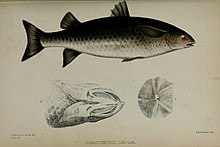Mullet, mullets, The Mullet or The Mullets may refer to:

The mullets or grey mullets are a family (Mugilidae) of ray-finned fish found worldwide in coastal temperate and tropical waters, and some species in fresh water. Mullets have served as an important source of food in Mediterranean Europe since Roman times. The family includes about 78 species in 26 genera.

Threadfins are silvery grey perciform fish of the family Polynemidae. Found in tropical to subtropical waters throughout the world, the threadfin family contains eight genera and about 40 species. An unrelated species sometimes known by the name threadfin, Alectis indicus, is properly the Indian threadfish.
Jean-Jacques Dussumier (1792–1883) was a French voyager and merchant from Bordeaux. He is known as a collector of zoological species from southern Asia and regions around the Indian Ocean between 1816 and 1840. These collections were later studied and classified by French zoologists such as Georges Cuvier, Achille Valenciennes, among others.

Crenimugil is a genus of mullets found in coastal marine waters and rivers in the Indo-Pacific region.

Mugil is a genus of mullet in the family Mugilidae found worldwide in tropical and temperate coastal marine waters, but also entering estuaries and rivers.

Clinus is a genus of clinids found in the southeastern Atlantic and western Indian Ocean.
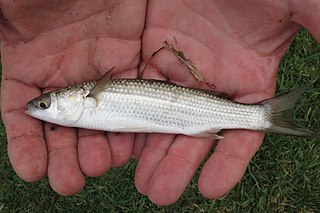
The freshwater mullet is a species of ray-finned fish in the family Mugilidae. It is endemic to South Africa.
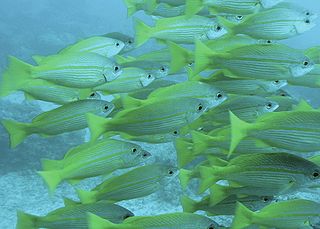
Lutjanus is a genus of marine ray-finned fish, snappers belonging to the family Lutjanidae. They are found in the Atlantic, Indian, and Pacific Oceans. They are predatory fish usually found in tropical and subtropical reefs, and mangrove forests. This genus also includes two species that only occur in fresh and brackish waters.
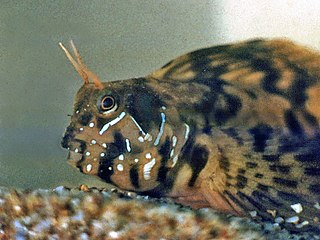
The sphinx blenny is a species of combtooth blenny, and the only species in the genus Aidablennius. It was described by Achille Valenciennes in 1836, originally under the genus Blennius, and was later reassigned under "Aidablennius" by Gilbert Percy Whitley in 1947. It is a subtropical blenny known from Morocco, in the eastern Atlantic Ocean, and also from the Mediterranean and Black Seas. Sphinx blennies inhabit shallow, rocky waters in the littoral zone, with sunlight exposure. They feed primarily on benthic algae, weeds and invertebrates. Sphinx blennies can measure up to 8 centimetres (3.1 in) long in total length.

Istiblennius is a genus of combtooth blennies found in the Pacific and Indian Oceans. The generic name is a compound noun composed of istio the Greek for "sail", referring to the high dorsal fin of the type species, Istiblennius muelleri, and blennius which is derived from a word for "mucus" and refers to the scaleless bodies that characterise the Blenniidae.

Omobranchus is a large genus of combtooth blennies found in the Pacific, Atlantic, and Indian oceans.

Parablennius is a diverse genus of combtooth blennies found in the Atlantic, western Pacific, and Indian Ocean.

Scartichthys is a genus of combtooth blennies found in the Atlantic and Indian Ocean.

Ophiocara is a genus of fishes in the family Butidae native to tropical waters of Indo-Pacific.
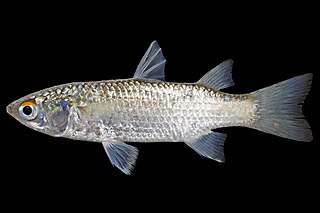
Planiliza is a genus of mullets found in coastal marine waters, estuaries and rivers in the Indo-Pacific.
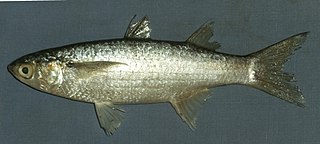
Osteomugil is a genus of mugilid mullets found in coastal waters of the Indo-Pacific, including estuaries and rivers. They were formerly included in Moolgarda and Valamugil.

Planiliza carinata, the keeled mullet, is a species of grey mullet from the family Mugilidae which is found in the western Indian Ocean and eastern Mediterranean Sea. It colonised the Mediterranean by Lessepsian migration from the Red Sea through the Suez Canal. The keeled mullet is a species of minor importance in commercial fisheries.

The Tstsikamma Marine Protected Area is a marine protected area on the south coast of South Africa, in both the Western Cape and Eastern Cape. It is on the coast of the Tsitsikamma National Park, and is one of the oldest MPAs in the country. The MPA provides protection for marine habitat and wildlife, including birds and threatened and endangered fish species.
